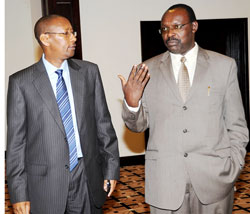The ongoing 2011 World Bank Group and International Monetary Fund spring meetings will discuss how to address power deficits in Africa, among other developmental issues.Ronald Nkusi, the Director of External Finance Unit (EFU) in the Ministry of Finance and Economic Planning, yesterday said this year’s spring meetings will focus on what it would take to transform Africa's energy sector.


The ongoing 2011 World Bank Group and International Monetary Fund spring meetings will discuss how to address power deficits in Africa, among other developmental issues.
Ronald Nkusi, the Director of External Finance Unit (EFU) in the Ministry of Finance and Economic Planning, yesterday said this year’s spring meetings will focus on what it would take to transform Africa's energy sector.
The Minister of Finance, John Rwangombwa, heads the Rwandan delegation that includes the Governor of the National Bank, Francois Kanimba.
In an interview with The New Times, yesterday, the Minister of infrastructure, Vincent Karega, , laid emphasis on the importance of Energy.
"Energy is used to power life, to process food and natural resources into value added goods. Africa status on energy production, distribution and affordability is at a low level. That impedes development in many ways and quality of life,” Karega said.
"In Rwanda, so far, only 13 percent of the population has access to electricity while 45 percent of energy is thermal.”
Karega noted that energy was very expensive but plans are underway to ensure that 50 percent of the Rwandan population have access to energy by 2017.
During the semiannual meetings of the WB and IMF, government officials, the private sector, journalists, civil society representatives, and other observers gather in Washington DC to discuss various developmental issues.
Progress on the work of the World Bank and IMF is discussed, as well as, other events focused on the global economy, international development, and the world’s financial markets.
Ends


